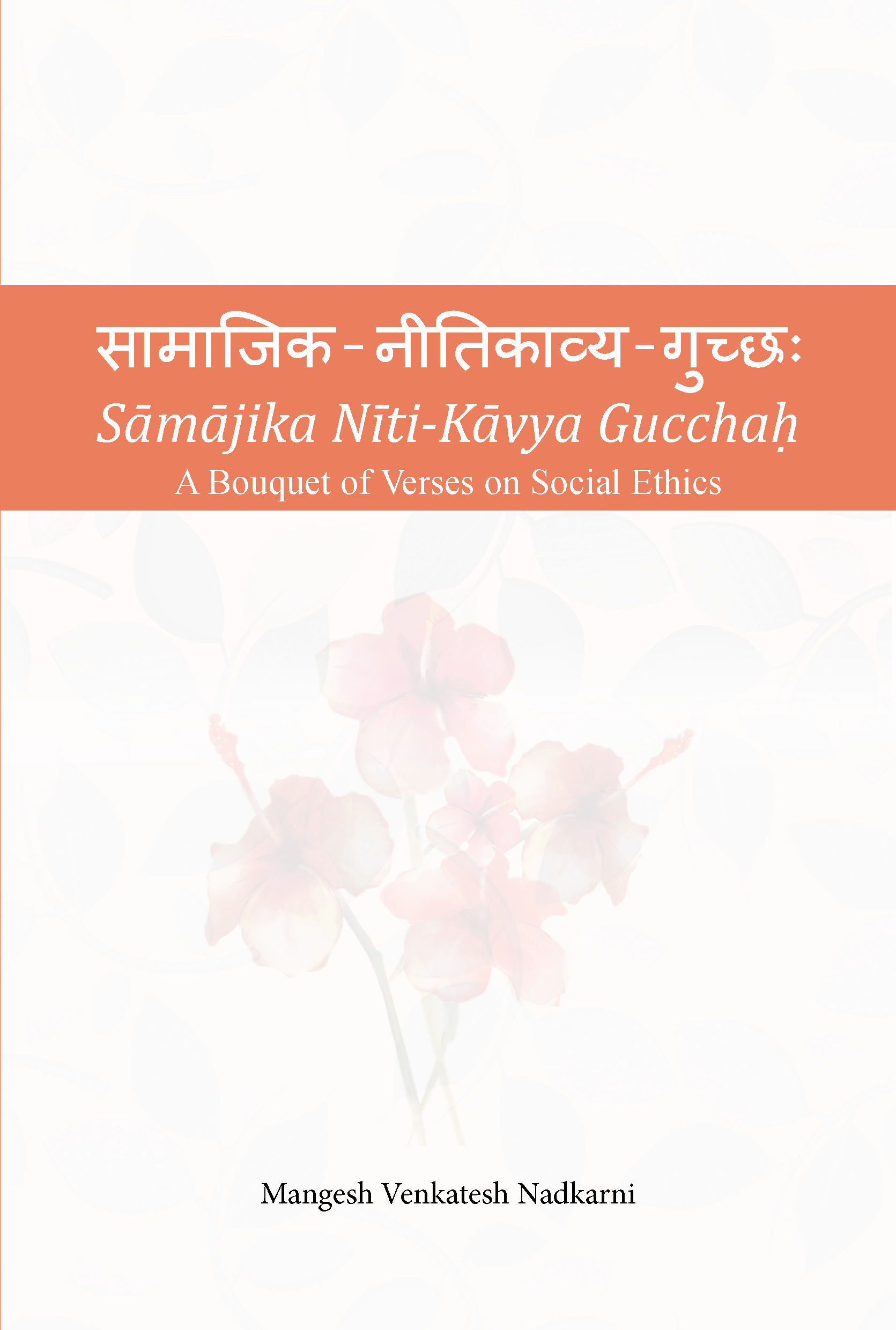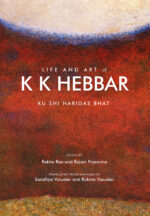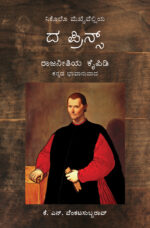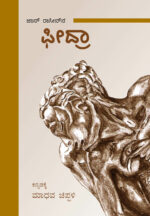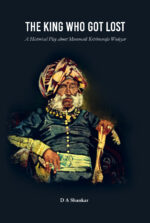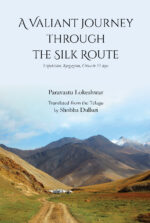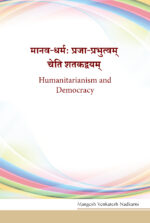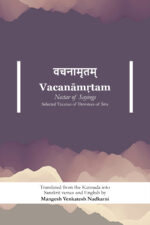Saamaajika Neeti Kaavya Gucchah
₹395.00
Author: M V Nadkarni
The book Samajika Niti-Kavya Gucchah contains five satakams (sets of hundred verses) on social ethics, inspired by the ancient Sanskrit poet, Bhartrhar’s Niti-satakam. They are on environmental ethics, Gandhi’s ethical philosophy, Hinduism from the ethical perspective of Gandhi, humanitarianism, and ethical philosophy of democracy including human rights. There are also two dasakams (sets of ten verses), being prayers to goddess Sharada and goddess Mahalakshmi, one at the beginning and the other at the end of the satakams, respectively; seeking wisdom and end to poverty and inequality in the world. Though the original compositions are in Sanskrit, the book provides their lucid translation into English with word-to-word meaning and annotation.
The book is a short but comprehensive introduction to social, political, economic, and environmental ethics, and can be an aid in learning Sanskrit through modern problems showing the language as relevant for contemporary concerns as well.
Interested customers may write to us at mup@manipal.edu about purchasing the book.
| Also available on |
| Category: | Texts in Translation |
|---|
| Author | |
|---|---|
| Format |
Related products
-
Life and Art of K K Hebbar
₹2,000.00Author: Haridas Bhat Editors: Rekha Rao, Rajani Prasanna Translators: Sandhya Vasudev, Rukma Vasudev
K K Hebbar was a trailblazer in Indian art. His contributions to modern Indian art as an artist, teacher, and art administrator are unparalleled. What is ‘Indian’ in modern Indian art has been a subject of discussion since the beginning of the modernist movement. Hebbar’s oeuvre is an answer to that question. It is modern and yet, intensely Indian, both in terms of subjects and treatment. Hebbar remained rooted in his native soil. His line drawings are a treasure of Indian art. No one has surpassed them in their delicacy and lyricism.
This biography is Mr Bhat’s affectionate account of his friend Hebbar’s life and art. The strength of Hebbar’s character comes through in his narration. Integrity and self-discipline were Hebbar’s defining qualities. Arguably, the man was greater than his work. And that makes his story intriguing. This biography of a major artist is a welcome addition to the meagre literature on Indian artists.
Interested customers may write to us at mup@manipal.edu about purchasing the book.
Also available on

-
The Prince
₹199.00Author: K N Venkatasubba Rao
ಮೆಖೈವಲ್ಲಿ ನವೋದಯ ರಾಜತಾಂತ್ರಿಕ, ತತ್ವಜ್ಞಾನಿ, ಬರಹಗಾರ. ಇಟಲಿಯ ಫ್ಲಾರೆನ್ಸ್ ನಗರದ ಬಡಕುಟುಂಬದಲ್ಲಿ 1469ರಲ್ಲಿ ಜನಿಸಿದ ಮೆಖೈವಲ್ಲಿ ತನ್ನ 21ನೆಯ ವಯಸ್ಸಿನಲ್ಲಿ ಫ್ಲಾರೆಂಟೈನ್ ಪ್ರಾಂತ್ಯದ ರಾಜಕೀಯ ರಂಗ ಪ್ರವೇಶಿಸಿದ. ಫ್ಲಾರೆನ್ಸಿನ ಆಡಳಿತಕ್ಕೆ ಅಗತ್ಯ ಬೇಹುಗಾರಿಕೆ ಮಾಹಿತಿ ಒದಗಿಸುವುದು ಮೆಖೈವಲ್ಲಿಯ ಹೊಣೆಯಾಗಿತ್ತು. ಅಧಿಕಾರದ ಗಳಿಕೆ, ಬಳಕೆ ಮತ್ತು ರಕ್ಷಣೆಯ ನಿಟ್ಟಿನಲ್ಲಿ ಮನುಷ್ಯ ಪ್ರಪಂಚಕ್ಕೇ ಅನ್ವಯವಾಗಬಲ್ಲಂತಹ ಮಾರ್ಮಿಕವಾದ ಬೃಹತ್ ವಿನ್ಯಾಸ ಅವನೊಳಗೆ ರೂಪುಗೊಳ್ಳುತ್ತಿತ್ತು. ಈ ಸಂದರ್ಭದಲ್ಲೇ ಫ್ಲಾರೆನ್ಸ್ ಗಣರಾಜ್ಯ ಪತನಗೊಂಡಿತು. ರಾಜಕುಟುಂಬದ ವಿರುದ್ಧ ಪಿತೂರಿಯ ಆರೋಪಕ್ಕೆ ಗುರಿಯಾಗಿ ಮೆಖೈವಲ್ಲಿ ಅಧಿಕಾರಭ್ರಷ್ಟನಾಗಬೇಕಾಯಿತು. ತನ್ನ ಜೀವಿತದ ಮುಂದಿನ ದಿನಗಳನ್ನು ಬರವಣಿಗೆಗೆ ಮೀಸಲಿಟ್ಟಿದ್ದ ಮೆಖೈವಲ್ಲಿ ಐವತ್ತೆಂಟನೆಯ ವಯಸ್ಸಿನಲ್ಲಿ ಅಂದರೆ 1527ರಲ್ಲಿ ವಿಧಿವಶನಾದ. 1532ರಲ್ಲಿ ಅಚ್ಚು ಕಂಡ ಅವನ `ಪ್ರಿನ್ಸಿಪೆ’, ಇಂಗ್ಲಿಷಿನಲ್ಲಿ `ದ ಪ್ರಿನ್ಸ್ ‘ ಆಗಿ 1640ರಲ್ಲಿ ಅಧಿಕೃತವಾಗಿ ಪ್ರಕಟಗೊಂಡಿತ್ತು. ಯುರೋಪಿನ ವ್ಯಾಪ್ತಿಯೊಳಗೆಯೇ ಸಾಕಷ್ಟು ವದಂತಿಗಳಿಗೆ ಒಳಗಾಗಿದ್ದ `ಪ್ರಿನ್ಸಿಪೆ’, `ದ ಪ್ರಿನ್ಸ್ ‘ ಆಗಿ ಮೆಚ್ಚುಗೆ ಮತ್ತು ಟೀಕೆಗಳನ್ನು ಇಂದಿಗೂ ಎದುರಿಸುತ್ತಲೇ ಇದೆ. ಮೆಖೈವಲ್ಲಿ `ಆಧುನಿಕ ರಾಜತಂತ್ರದ ಜನಕ’ ಎಂಬ ಹೆಗ್ಗಳಿಕೆಗೆ ಪಾತ್ರನಾಗಿದ್ದಾನೆ. ಅವನನ್ನು ಅರ್ಥಶಾಸ್ತ್ರದ ಕರ್ತೃ ಕೌಟಿಲ್ಯನೊಡನೆ ಹೋಲಿಸುವ ವಾಡಿಕೆ ಇದೆ. ಇದು ಎಷ್ಟು ಸಮಂಜಸ ಎಂಬುದರ ಬಗ್ಗೆಯೂ ಪ್ರಾಜ್ಞರ ನಡುವೆ ಜಿಜ್ಞಾಸೆಯಿದೆ.
Interested customers may write to us at mup@manipal.edu about purchasing the book.
Also available on

-
Phedra
₹180.00Translator: Madhava Chippalli
ರಾಸೀನ್ನ ಫೀದ್ರಾ ನಾಟಕವು ಪಾಶ್ಚಿಮಾತ್ಯ ನಾಟಕ ಸಾಹಿತ್ಯದಲ್ಲೇ ಒಂದು ಆಯಕಟ್ಟಿನ ಕೃತಿ. ಗ್ರೀಕ್ ಮತ್ತು ಎಲಿಜಬೆಥನ್ ನಾಟಕಗಳಲ್ಲಿ ಕಾಣಸಿಗದ ಹೊಸ ಬಗೆಯ ಮನೋಲೋಕವೊಂದನ್ನು ತನ್ನ ಪಾತ್ರಗಳಿಗೆ ಧಾರಣೆ ಮಾಡಿಸಿದ ಈ ನಾಟಕವು ಆ ಮೂಲಕವೇ ಈ ಪರಂಪರೆಯಲ್ಲಿ ಮನೋವಿಜ್ಞಾನಕ್ಕೆ ಒಂದು ಖಾಯಂ ಸ್ಥಾನವನ್ನು ಒದಗಿಸಿಕೊಟ್ಟಿತು. ಮುಂದೆ ಬಹುತೇಕ ಪಾಶ್ಚಿಮಾತ್ಯ ನಾಟಕಗಳು ಈ ಪರಂಪರೆಯನ್ನು ಮುಂದುವರಿಸಿದವು; ರಂಗಭೂಮಿಯಲ್ಲೂ ಮನೋಲೋಕವನ್ನು ಮುಂದಕ್ಕೆ ತರುವ ವಿಭಿನ್ನ ಪ್ರಯೋಗಗಳಿಗೆ ಈ ಪರಂಪರೆಯು ಚಾಲ್ತಿ ನೀಡಿತು. ಈ ಸಂಪ್ರದಾಯಕ್ಕೆ ವಿರೋಧಿಯಾದ ಫ್ರಾನ್ಸಿನ ಪ್ರಸಿದ್ಧ ರಂಗಕರ್ಮಿ ಆಂತೋನಿನ್ ಆರ್ತೋನ ಮಾತುಗಳನ್ನು ಕೇಳುವುದಾದರೆ, ಪಾಶ್ಚಿಮಾತ್ಯ ರಂಗಭೂಮಿಯಲ್ಲಿ ‘ಸೈಕಾಲಜಿಯ ದುರ್ಬೀಜ’ ಬಿತ್ತಿದ ಕೃತಿ ಇದು! ಹಾಗಿರುವುದರಿಂದ, ನಾವು ಈ ನಾಟಕವನ್ನು ಹೇಗೇ ಓದಲಿ, ಓದದೆ ಇದ್ದರೆ ಅಷ್ಟರ ಮಟ್ಟಿಗೆ ಪಾಶ್ಚಾತ್ಯ ನಾಟಕ ಸಂಪ್ರದಾಯದ ಅರಿವು ಅಪೂರ್ಣ. ಅಂಥ ಪ್ರಮುಖ ನಾಟಕವೊಂದು ಇನ್ನೂ ಕನ್ನಡಕ್ಕೆ ಬಾರದೆ ಉಳಿದಿತ್ತು; ಆ ಲೋಪವನ್ನು ಈ ಅನುವಾದವು ಸಮರ್ಥವಾಗಿಯೇ ತುಂಬಿಸಿದೆ. ಮೂಲದ ನಿಷ್ಠೆಯೊಂದಿಗೆ ಭಾಷಾಗಾಂಭೀರ್ಯ ಮತ್ತು ಮಾತಿನ ಸುಭಗತೆ ಎರಡನ್ನೂ ಒಟ್ಟಿಗೇ ಹಿಡಿಯಲು ಯತ್ನಿಸಿರುವ ಈ ಅನುವಾದವನ್ನು ನಾನು ತುಂಬು ಮನಸ್ಸಿನಿಂದ ಸ್ವಾಗತಿಸುತ್ತೇನೆ.
Interested readers may write to us at mup@manipal.edu about purchasing the book.
-
Saga of The Uprooted
₹95.00Author: Ranga Hari, Translator: Saratchandra Shenoi
This English translation of Visthapanachi Katha, a Konkani Khanda Kavya, depicts the saga of the migration of the Konkani community from Goa to a land far away from home. This collection of poems encapsulates the reign of a colonial power over the region of Goa that began with the entry of the Portuguese in the 16th century. It illustrates the displacement of the Konkani people and their resurgence at Cochin port. The poems describe the transformation of Goa – both culturally and topographically – and the people of Goa who were plundered, displaced, uprooted, and were forced to strip off their culture and identity. The poet is unfolding the tale of his very own ancestors by tracing out these events and graphically portraying the plight of the Konkani people. Saratchandra Shenoi, the author of this English translation, is a multilingual translator and a Sahitya Akademi Award winning (Antarnad – 1999) Konkani poet based in Kochi. He has over twenty books to his credit which include collections of poetry, works of fiction and non-fiction, translations, edited anthologies and language guides. Ranga Hari is the author of the Konkani original text titled Visthapanachi Katha. He has written more than twenty-five books in different languages, and was associated with Bharatiya Sikshan Mandal and Vidya Bharati.
Interested readers may write to us at mup@manipal.edu about purchasing the book.
-
The King Who Got Lost: A Historical Play about Mummadi Krishnaraja Wodeyar
₹200.00Young Mummadi, put on the throne by the British after the last Mysore war in 1799, was brought up under the watchful guidance of the far-sighted and shrewd Dowager Maharani Lakshmammanni. After falling into the hands of the powerful and politically experienced Dewan Purnaiah, he had a tortuous and tortured life. The young prince was never able to outgrow the influence of two of these mentors. To add to this, Mummadi, fell prey to an easy and rather voluptuous life. He was married but in addition to his many wedded consorts, he was caught in the spying and quarrelsome domestic life. Mummadi could never, despite valiant efforts, free himself and grow into a self-confident king.
The pressures of the ruthless British administration and the local, disruptive, and rebellious chieftains made Mummadi’s life a sad, tragic tale bordering on the ridiculous and the pathetic.
Interested overseas customers may write to us at mup@manipal.edu about purchasing the book.
-
A Valiant Journey Through the Silk Route
₹575.00Author: Paravastu Lokeshwar, Translator: Shobha Dulluri
A Valiant Journey through the Silk Route is a travelogue that covers the incredible travel across the ancient Silk Route with the most alluring halts in Uzbekistan, Kyrgyzstan, and China to achieve a lifetime dream of a vagabond. The journey that starts in New Delhi and ends in Beijing opens up new vistas that are fascinating. The route covers historical monuments, museums, ancient oases, cemeteries, rural settings, public marketplaces, and several other landmarks and attractions. The travel continues through the deserts, passes by the rivers, treks up on the mountainous terrains – the path through which the great ancient travellers trudged.
Interested customers may write to us at mup@manipal.edu about purchasing the book.
Also available on

-
Humanitarianism and Democracy (Maanava Dharmah – Prajaaprabhutvam Cheti Shatakadvayam)
₹240.00Author: M V Nadkarni
These Satkarnas are Prof Nadkarni’s passionate plea for an authentic democratic order which guarantees the rights of every citizen while each citizen participates in it being fully aware of his / her duties. The complementarity of rights and duties is shown to be the essence of genuine democracy.
Interested customers may write to us at mup@manipal.edu about purchasing the book.
Also available on

-
Vacanāmṛtam – Nectar of Sayings
₹600.00Translator : Mangesh Venkatesh Nadkarni
The Śiva Śaraṇas of medieval Karnataka left a rich legacy of what are called Vacanas, or “Sayings,” in Kannada. These Vacanas were far ahead of their times in social awareness. They deplored the caste system and discrimination, upheld the dignity of women in family and society, stressed on the priority of work, and advocated charity, in addition to devotion to One God – Śiva. They also imparted practical wisdom for living honourably and meaningfully in the world.
Though the book is primarily meant for those who do not understand the original in Kannada, Kannadigas can also benefit from it. This is because the most interesting (320) of the vast number of Vacanas (more than 20,000) are selected and made accessible in one place here. The translations here are not literal or mechanical. They bring out the intent of the Vacanas while being truthful to the original at the same time.
Manipal Universal Press (MUP) is dedicated to making Vacana Sahitya accessible to the English audience. As a part of this effort, we have published a book titled Akka Mahadevi: The Questioning Poet-Saint. This work explores the life and enduring legacy of Akka Mahadevi, the influential 12th Century Kannada poet whose profound vacanas continue to inspire readers today.
Interested customers may write to us at mup@manipal.edu about purchasing the book.
Also available on


